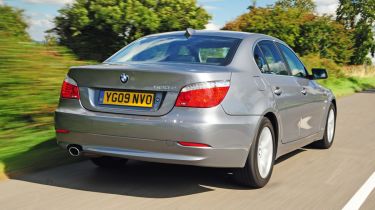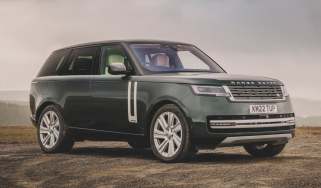BMW 520d SE
Don’t underestimate the big saloon’s enduring appeal
When it arrived in 2004, the BMW 5-Series was a revelation. It showcased the firm’s controversial new design approach and iDrive control system, and it couldn’t have been a more radical departure from the executive norm.
Its once shocking bodywork has mellowed with time, but it still looks fresh.
Parked next to the E-Class, the BMW is sharp and well proportioned, even with the relatively small 17-inch alloys that come as standard.
It’s finished off with deep bumpers, side skirts and an oval tailpipe, so there’s no doubt about the car’s sporting intentions.
Dark materials mean the interior is a gloomier place in which to spend time than the Mercedes, but the 5 feels more special than its competitor.
With a driver focused dashboard, supportive and easily-adjusted seats and smaller steering wheel, finding the perfect driving position is simple.
The seats provide more lateral support than those in the Mercedes, yet they’re still adequate on long journeys.
And while the more sombre cabin doesn’t feel as spacious as that of the E-Class, the 5-Series can still transport four passengers in comfort.
Get familiar with the revised iDrive system, and you’ll be just as happy navigating your way around the various menus.
On the move, the BMW’s 175bhp diesel engine is refined and smooth, although it is a little noisier than the Mercedes unit.
Peak torque of 350Nm is 50Nm down on its rival and it arrives 300rpm later, so you need to work the 520d a bit harder.
However, the slick six-speed manual box makes this a simple task, and the engine is smooth across the rev range.
Despite being the entry-level model in the 5-Series line-up, the 520d delivers lively performance, so it doesn’t seem like a poor relation.
The more punchy Mercedes feels faster, but it was hampered by its slower-shifting five-speed auto in our tests. Where the BMW really delivers is on fast and smooth roads, as it’s more engaging and rewarding to drive.
However, on rough surfaces the firmer suspension and less forgiving run-flat tyres are more apparent. Occupants aren’t cushioned as effectively as they are in the Merc.
The difference is small, but the cars reflect the strengths of their respective brands.
The E-Class has a more cosseting ride, but feels lifeless, while the BMW will appeal more to enthusiasts thanks to its greater composure and the extra feedback you get through its major controls.
In the crucial battle for company car honours, the two rivals are closely matched. For private buyers, the BMW has slightly lower resale value forecasts, although the impressive five-year pre-paid servicing package all but cancels out the E-Class’s stronger residual predictions.
In terms of finances, then, the BMW is a sensible bet – especially if you want an auto, as its emissions of 149g/km trump the Mercedes. So, does that mean the 5-Series wins this test?
Details
Chart position: 1
WHY: As well as a spacious cabin, great build quality and striking looks, the 5-Series has masses of driver appeal.



